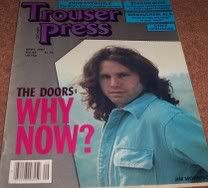Post by TheWallsScreamedPoetry on Dec 22, 2004 18:54:13 GMT
NOT TO TOUCH THE EARTH

Billy James has been besieged
by telephone calls from magazine and newspaper
writers. The tenth anniversary of Jim Morrison's death is
at hand. (It's now passed: Morrison was reported to
have succumbed to a heart attack in his bathtub in
Paris July 3, 1971.)
A best-selling trade paperback biography of Morrison is now available in a mass-market edition. Albums by Morrison's group, The Doors,
are selling better than ever. And, a surprising
number of young bands are citing the Doors as a major
influence. These groups and many of their fans were barely old enough to go to school when Morrison and company released their first album. 14 years ago. Ten years after their leader's demise, and seven or so after the rest of the group disbanded, the Doors are a hot
item.
As Columbia Records' Los Angeles-based manager of
talent acquisition and development, Billy James signed
Morrison and an early incarnation of The Doors to the
label in 1966. No one else at Columbia was interested,
and The Doors were dropped without leaving a ripple.
The group became the property of Elektra Records, a
(then) New-York based label expanding from folk music to the burgeoning rock scene. Coincidentally, James was
hired to man the label's new Los Angeles
office.
James is intelligent and sensitive (qualities not
rampant in the record business), and knows what he's
talking about. He is therefore the Man To Ask about old
LA bands. The telephone rings: another reporter.
James picks up the handset. "Now, who's died?" he
sighs.
If Billy James is the man people call for informed
opinion, Danny Sugarman is the one who'll call you to
offer it. Co-author with Jerry Hopkins of the Morrison
biography No One Here Gets Out Alive, Sugarman first met The Doors before he was in high school, and was - to hear him tell the story - pretty well inseparable from
Morrison until the singer's death. "By the time I went to
work for them, I was given the title 'office
assistant.' I answered the telephone, opened mail. Most
people would call me a go-fer, but I never really liked
that term. I did just about anything. Hell, though, I
would have been Jim's pet if he'd asked me."
After Morrison's death and The Doors official split,
Sugarman mounted a veritable one-man campaign to keep the faith. "I could tell you that The Doors were the
greatest band ever, and that wouldn't be hype - because I truly believe it to be the case."
Though the relationship, was strong between Morrison and Sugarman, the still-young Doors fan (just 25 now) stayed in contact with the rest of the group, and became involved in keyboardist Ray Manzarek's management. If there were any rumors in circulation about The Doors, Sugarman could be counted upon to have started (or able to stop) stop them. While Manzarek, guitarist Robby Krieger and durmmer John Densmore kept pretty much to themselves, Sugarman answered questions on their behalf. He was used to it. "When Jim was alive, he got tired of answering questions that he'd get in the mail. So I wound up answering them for him, over his signature. He thought that was just fine, that I was in tune with what he'd have to said."
Totally unofficially, Sugarman took it upon himself to
keep The Doors in the news as much as possible. "Every
six months, there'd be something about The Doors in
(Rolling Stone's) Random Letters," he claims. Whether that specific figure is true or not - and whether Sugarman was the source of whatever information did come to the attention of the press (Elektra Records sure wasn't) - The Doors managed to stay in the public consciousness far longer than their contemporaries (Love, The Seeds, The Palace Guard, etc.) It might be ventured that The Doors were every bit as prominent as The Byrds, and with considerably less product available or effort spent on their
behalf.
Every year," Sugarman says, "the Doors catalogue has
sold something like 300,000 albums for Elektra. And
that was before the book came out." Indeed, 10 of the
Doors' 12 Albums are RIAA certified gold or more. There
are three "Greatest Hits" packages (including one
released in quadraphonic sound) and a fourth anthology
(Weird Scenes Inside The Goldmine) thats a sort of "best of the rest."
BY TODD EVERETT - TROUSER
PRESS - SEPT 1981

Billy James has been besieged
by telephone calls from magazine and newspaper
writers. The tenth anniversary of Jim Morrison's death is
at hand. (It's now passed: Morrison was reported to
have succumbed to a heart attack in his bathtub in
Paris July 3, 1971.)
A best-selling trade paperback biography of Morrison is now available in a mass-market edition. Albums by Morrison's group, The Doors,
are selling better than ever. And, a surprising
number of young bands are citing the Doors as a major
influence. These groups and many of their fans were barely old enough to go to school when Morrison and company released their first album. 14 years ago. Ten years after their leader's demise, and seven or so after the rest of the group disbanded, the Doors are a hot
item.
As Columbia Records' Los Angeles-based manager of
talent acquisition and development, Billy James signed
Morrison and an early incarnation of The Doors to the
label in 1966. No one else at Columbia was interested,
and The Doors were dropped without leaving a ripple.
The group became the property of Elektra Records, a
(then) New-York based label expanding from folk music to the burgeoning rock scene. Coincidentally, James was
hired to man the label's new Los Angeles
office.
James is intelligent and sensitive (qualities not
rampant in the record business), and knows what he's
talking about. He is therefore the Man To Ask about old
LA bands. The telephone rings: another reporter.
James picks up the handset. "Now, who's died?" he
sighs.
If Billy James is the man people call for informed
opinion, Danny Sugarman is the one who'll call you to
offer it. Co-author with Jerry Hopkins of the Morrison
biography No One Here Gets Out Alive, Sugarman first met The Doors before he was in high school, and was - to hear him tell the story - pretty well inseparable from
Morrison until the singer's death. "By the time I went to
work for them, I was given the title 'office
assistant.' I answered the telephone, opened mail. Most
people would call me a go-fer, but I never really liked
that term. I did just about anything. Hell, though, I
would have been Jim's pet if he'd asked me."
After Morrison's death and The Doors official split,
Sugarman mounted a veritable one-man campaign to keep the faith. "I could tell you that The Doors were the
greatest band ever, and that wouldn't be hype - because I truly believe it to be the case."
Though the relationship, was strong between Morrison and Sugarman, the still-young Doors fan (just 25 now) stayed in contact with the rest of the group, and became involved in keyboardist Ray Manzarek's management. If there were any rumors in circulation about The Doors, Sugarman could be counted upon to have started (or able to stop) stop them. While Manzarek, guitarist Robby Krieger and durmmer John Densmore kept pretty much to themselves, Sugarman answered questions on their behalf. He was used to it. "When Jim was alive, he got tired of answering questions that he'd get in the mail. So I wound up answering them for him, over his signature. He thought that was just fine, that I was in tune with what he'd have to said."
Totally unofficially, Sugarman took it upon himself to
keep The Doors in the news as much as possible. "Every
six months, there'd be something about The Doors in
(Rolling Stone's) Random Letters," he claims. Whether that specific figure is true or not - and whether Sugarman was the source of whatever information did come to the attention of the press (Elektra Records sure wasn't) - The Doors managed to stay in the public consciousness far longer than their contemporaries (Love, The Seeds, The Palace Guard, etc.) It might be ventured that The Doors were every bit as prominent as The Byrds, and with considerably less product available or effort spent on their
behalf.
Every year," Sugarman says, "the Doors catalogue has
sold something like 300,000 albums for Elektra. And
that was before the book came out." Indeed, 10 of the
Doors' 12 Albums are RIAA certified gold or more. There
are three "Greatest Hits" packages (including one
released in quadraphonic sound) and a fourth anthology
(Weird Scenes Inside The Goldmine) thats a sort of "best of the rest."
BY TODD EVERETT - TROUSER
PRESS - SEPT 1981

